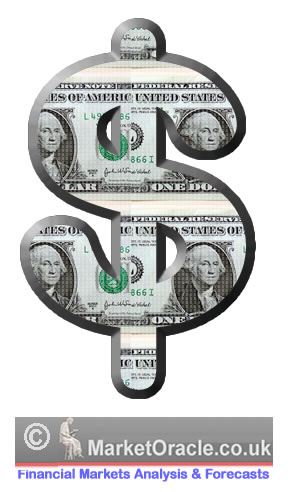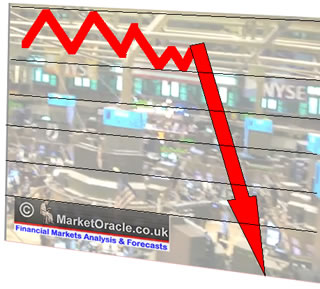Weak Start to European Stock Markets
Stock-Markets / European Stock Markets May 26, 2009 - 05:43 AM GMTBy: PaddyPowerTrader
 Stock markets remained on the defensive overnight, with the Dax yesterday closing at 4918 while the Nikkei was last down 69 at 9277. International tensions remain elevated in the wake of the nuclear test by North Korea with wires reporting there could be further missile tests by the country this week. There are also fears that shares in the Stoxx 600 may have gotten well ahead of themselves, with a P/E ratio of 24 (a 5 year high) versus the cycle low of 8.3 in Nov 2008.
Stock markets remained on the defensive overnight, with the Dax yesterday closing at 4918 while the Nikkei was last down 69 at 9277. International tensions remain elevated in the wake of the nuclear test by North Korea with wires reporting there could be further missile tests by the country this week. There are also fears that shares in the Stoxx 600 may have gotten well ahead of themselves, with a P/E ratio of 24 (a 5 year high) versus the cycle low of 8.3 in Nov 2008.
Today’s Market Moving Stories
- Saudi Arabia warned that oil prices could spike back to US$150 per barrel over the next three years unless there is a pick-up in investment.
- Australian Press focus on the threat of further downgrades to sovereign ratings, suggesting that the move away from AAA on Japan’s foreign currency rating and the shift to negative outlook for the UK opens a potential ‘pandora’s box’ of further ratings actions. This in turn could hamper demand for sovereign debt and especially U.S Treasuries.
- Japanese corporate service price fell 2.4% y/y in April, vs 2.1% y/y last month.
- Germany’s financial regulator Bafin has urged the country’s banks to make use of the government’s bad-bank plan or else face their toxic assets blowing up like grenades. The UK’s Daily Telegraph picked up on the warning from Bafin that the banks face the danger of a series of brutal downgrades of mortgage securities, which would deplete their capital reserves and put the entire system under stress. Bafin said the German banks have EUR200bln of bad debts sat on their books. “We are pretty sure that within a month or two our banks will feel the full force of the sharpest recession ever on their credit portfolios.” However, once that is pushed out to the pull range of ‘problematic’ assets and the number really spirals. The Telegraph said an internal Bafin memo suggested the total of write-offs could come to EUR816 bln - twice the reserves of Germany’s financial institutions.
- BoE MPC member Blanchflower (at least for the next five days, anyway) warned the committee not to remove its easy policy too quickly. He said he was concerned that as soon as the MPC sees the start of recovery it will stamp on it with policy and destroy it. He said it took too long to get the right tactics in place, but now that they are, the opportunity for sustained recovery should not be squandered.
- The ECB’s resident hawk Axel Weber was quoted yesterday as saying the financial system was stabilising and some positive signs were being seen but that he would warn against judging the current situation more positive than it actually is. Note the IFO yesterday only improved to 84.2 from 83.7 last with current conditions actually worsening.
- More on the U.S housing market woes, an excellent piece from the NYT warning of the next wave of defaults.
- European equities making the headlines today include Danone, whose shares are down on a Euro 3bn rights issue announcement. Cable and Wireless are likewise heading south after a broker downgrade. Rio Tinto is also suffering after an iron ore prices deal that saw it cut prices by a third to Japanese steelmakers.
- In a very convoluted and opaque IMS Greencore has rebased its dividend policy to 40-50% of adjusted EPS. The cut is immediate; the first half dividend of 3c compares to 5.3c last year. Not a huge surprise but none the less will pressure the share price. In terms of outlook, Greencore states that it is on track to deliver operating profit in line with FY 2008 on a constant currency basis, but it notes how critical H2 trading is to its expectation. Looks a bit over optimistic to me and the recent 66% rally in the share price could well be used as an advisable exit point.
Don’t Believe The Hype. China Is Still A Captive Customer Of The U.S.
The human cost of the US recession has been terrible in terms of the jobs lost, but one good thing that has come out of the slump has been the deleveraging in the private sector. For example, household debt was broadly steady last year as mortgage debt contracted slightly, while corporate debt was also little changed. Deleveraging is painful, but reduced gearing and increased saving is a recipe for more sustainable, albeit, more moderate growth.
 Digging deeper into the numbers, though, shows that the US as a whole is still gearing up, with debt fast approaching two-and-a-half times national income. This is happening as much of the adjustment in private-sector balance sheets simply represents a transfer of debt to the public sector, such that total non-financial debt is still growing at a solid rate and faster than growth in the economy. This underscores the market’s nervousness about the size of the Budget deficit in the US, which at close to 15% of GDP is the sort of deficit previously only seen during a world war.
Digging deeper into the numbers, though, shows that the US as a whole is still gearing up, with debt fast approaching two-and-a-half times national income. This is happening as much of the adjustment in private-sector balance sheets simply represents a transfer of debt to the public sector, such that total non-financial debt is still growing at a solid rate and faster than growth in the economy. This underscores the market’s nervousness about the size of the Budget deficit in the US, which at close to 15% of GDP is the sort of deficit previously only seen during a world war.
In the past, the onset of peace was the fix for big deficits, but this time, it’s not clear whether the Government will take the tough decisions to bring things under control over the next three to five years, hoping instead that the resumption of growth will help take care of the problem. With the task of deleveraging shifted from the private to the public sector, it helps explain how the market is a little more willing to buy riskier assets like corporate debt and mortgages, while being less attracted to “risk-free” Treasuries. Thankfully, though, the US still has China to buy its bonds, otherwise things would be much worse. That is, while China is buying Treasuries at a less frantic pace than late last year, its purchases now finance the bulk of America’s current account deficit, with its holdings of Treasuries recently passing three-quarters of a trillion dollars mark.
It’s not clear that China can easily avoid buying more US assets (no matter it’s reported concerns over America’s fiscal strategy and the risk of a dollar collapse) as it would quickly run up against the national interest in most countries if it bought anything other than vanilla assets in large quantities. The sheer size of its reserves means China should remain a captive customer of US assets. Other investors don’t face the same constraints as China and can easily demand more of a return for buying Treasuries as the USD slides.
This creates a dilemma for the Federal Reserve as higher Treasury yields push mortgage rates higher, threatening the tentative stabilisation in the housing sector and forcing it to undertake more QE. More QE is a short-term fix and does little to assuage longer-term investor doubts about what exactly the US Government will do to rein in the massive Budget deficit. This means the risk is that the USD can continue to slide. The further QE goes on, it will also raise doubts about how the Fed will behave once recovery takes hold as monetising the deficit has blurred the line between monetary and fiscal policy and makes you wonder whether the long-term cost of such close co-ordination between itself and the Government is reduced independence.
Ahead Today
The US S&P/Case Shiller Composite 20 house prices for March is out today at 14:00 BST. This measure of house prices is still falling and it should be 18.4% below a year ago.
Also out is the US TCB consumer confidence for May. Released at 15:00 BST, the survey should improve further to 39.2, up from the February low of 25, even though confidence is still extremely weak.
A cautionary tale about lunchtime over-indulgence.
And Finally…
Michio Hoshino, a photographer known for his pictures of bears and other wildlife, was mauled to death by a brown bear on the Kamchatka Peninsula in eastern Russia. He was in his mid-40’s and lived in Fairbanks, Alaska. This is the last photo he took.

Disclosures = None
By The Mole
PaddyPowerTrader.com
The Mole is a man in the know. I don’t trade for a living, but instead work for a well-known Irish institution, heading a desk that regularly trades over €100 million a day. I aim to provide top quality, up-to-date and relevant market news and data, so that traders can make more informed decisions”.
© 2009 Copyright PaddyPowerTrader - All Rights Reserved
Disclaimer: The above is a matter of opinion provided for general information purposes only and is not intended as investment advice. Information and analysis above are derived from sources and utilising methods believed to be reliable, but we cannot accept responsibility for any losses you may incur as a result of this analysis. Individuals should consult with their personal financial advisors.
PaddyPowerTrader Archive |
© 2005-2022 http://www.MarketOracle.co.uk - The Market Oracle is a FREE Daily Financial Markets Analysis & Forecasting online publication.



